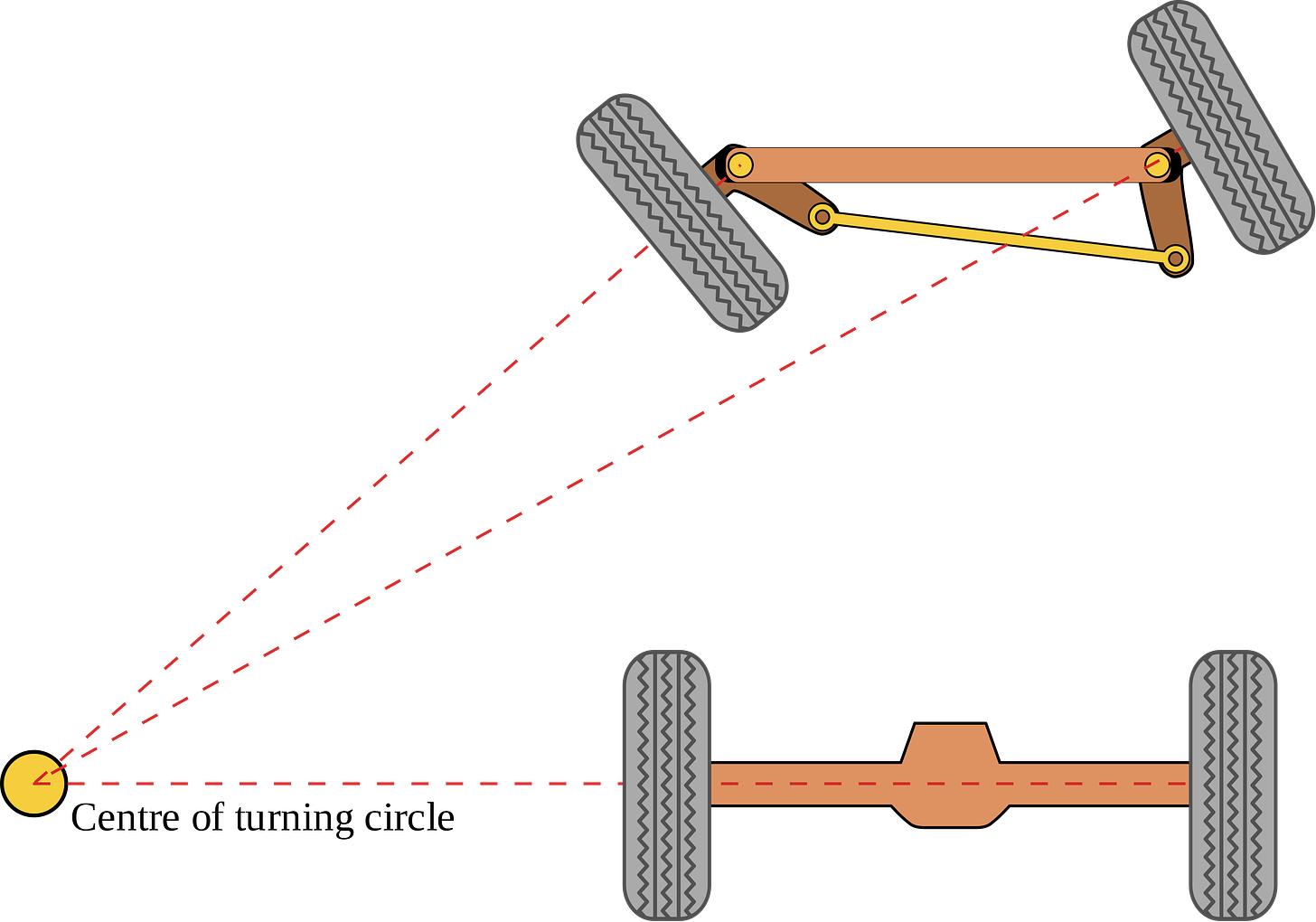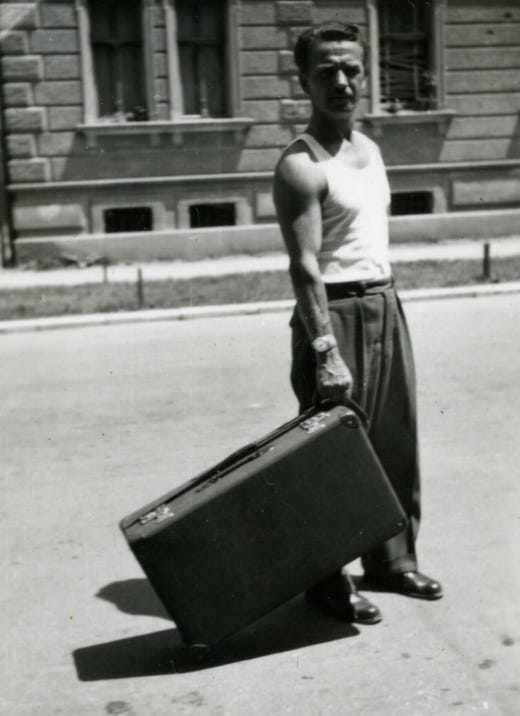
Reinvent the wheel. I mean it, literally. Build a small toy, and make it mobile with some spinning parts, but without using pre-made wheels. What will you use? Look around the house, or to be more authentic still, go walk in a forest. Take stock of what the natural world offers you. Perhaps you could take this round-ish stone and polish it to make it evenly circular. Or you could cut a slice of a small tree. Several, in fact, since you’ll probably need multiple wheels. How many? Do they need to be all of the same size? How will you attach them together? Will you allow the wheels to turn left and right, and if so, how will that be controlled?
Reinvent the wheel, because it’s less trivial than it sounds. There are many challenges to consider! For instance, how to steer: you want the wheels to turn at different angle, instead of being both on a fixed axle.

If you reinvent the wheel from scratch, you probably won’t (and shouldn’t) think about such things from the beginning. You’ll solve problems that have had solutions for centuries or millennia. Is that bad? Shouldn’t you begin by reading a book about wheels, maybe? Get a degree in wheel engineering? Make sure you’re all caught up with the current state of wheel knowledge before you begin to presume you can productively reinvent it?
Well, it depends. Are you more likely to reinvent the wheel if you read that book or get that degree? Or is it more likely to drain out all the excitement and thrill of thinking about wheel design right now?
You should reinvent the wheel because it’s fun. Doing things directly, instead of reading or listening about them, is more satisfying. It gives you something to be proud of. It can be frustrating, the same way that working on a tough puzzle can be, but the elation you feel once you have solved your problem will make it worth it — far more than reading a textbook ever could.
You should reinvent the wheel because it’s a good way to learn, too. This is not a separate point from the “fun” one: the best way to learn anything is to have fun with it! Plus, practical experience will teach you a myriad small details than a book or instructor might miss (or that you might miss because the boredom made you distracted as you were trying to learn).
These are reasons for you, an individual, to reinvent the wheel. Should we, a society, want you to reinvent the wheel? Wouldn’t there be a more productive use of your time?
I say that we should. We should all encourage each other to reinvent wheels, because that is the best way to come up with totally new knowledge.
Inevitably, as you reinvent the wheel, you will want to apply it to new problems. It took forever for humanity to add wheels to suitcases, even though that’s a very simple concept and there was no technological barrier preventing it. What else is like this? I don’t know, and neither does anyone, but the person who’s closest to discovering it is the person who’s been busy reinventing wheels for fun and learning.

Besides, you should reinvent the wheel without going through the books and the degrees first, because that’s a good way to avoid the bias in the books and degrees. Perhaps there exists a better solution to wheel design, but no one will ever find it if they study the existing solutions first. Society may be trapped into a local maximum.
So you should reinvent the wheel as a way to increase cultural diversity. There’s always a tension between diversity and uniformity — in theory, if there’s a “best” solution to a problem, like wheel design, then the obvious right move is for everyone to adopt it. Diversity, then, means voluntarily accepting that not everything be optimal. The reason that diversity is valuable anyway is that we can almost never be totally sure that there does not exist a better design out there! We need the diversity as a way to hedge our bets. Don’t put all your money into that single best-performing stock — because you may be wrong that it’s actually the best strategy. Don’t put all your efforts in teaching everyone the same wheel design — because there might be something else out there, and we want to find it.
Of course, reinvent the wheel while being conscious of the associated risks. If you’re totally clueless, and you happen to be reinventing wheels for a scythed chariot, you might hurt yourself or someone you love.
So you should reinvent the wheel while using good judgement. If you suspect that you may be doing something dangerous, pause, think, take precautions. If you find yourself hindered by the lack of background knowledge, you should go and read that textbook on wheels! It is your personal mission as a wheel reinventor to figure out the best path forward. Seek help when you feel that help is needed.
But do trust your own judgment. If you’re publicly open about reinventing the wheel — and for many reasons, you probably should be — then tons of people will criticize you for it. They’ll suggest you first read a book. They’ll say you should listen to existing wheel experts. They’ll say that what you’re doing is “embarrassing.”
Usually, such people haven’t reinvented anything. It’s fine to just ignore them.
It doesn’t mean that everything the critics say is wrong, of course. In your wheel reinvention, you may very well be — in fact, you almost certainly are — somewhat naïve about certain aspects. It’s possible that your new wheel design was actually invented in the 1980s and rejected as a pretty bad solution. If you were expecting to make money from selling your wheel design, you may be in for an unpleasant surprise. And then you’ll feel sorry about yourself, and wonder if maybe you should have listened to the critics.
The obvious workaround is to not expect to make money or reach any big life goals from your playful reinvention of the wheel. You’re doing this for fun and learning, remember? But sometimes making money is nice. It can be worth taking a project seriously. In that case, of course, new considerations arise, and criticism may contain a lot of useful information that would be useful to you. You’ll have to strike the right balance: listen to the critics enough that you cover your weaknesses, but not enough that you stop reinventing the wheel out of fear of “embarrassment.”
Yet even then, I want to say: start by reinventing the wheel unseriously — that is actually the best way to get to serious innovation. “The Beatles were a cover band, Sony was a radio repair, all learning begins with imitation and reverse-engineering.” Play around, find out, and start taking it the criticism only once you’re pretty confident that you’ve found a valuable idea.
Reinvent the wheel. Rediscover an ancient philosophical insight. Rewrite a common fairy tale. Remix an old piece of art. Revive retro visions of the future. These are actually your only options: you can’t come up with new ideas and inventions ex nihilo. If you don’t reinvent the wheel, then you won’t invent anything, and one day you’re going to wake up and wonder why you’ve never achieved any of the grand ambitions you once dreamed of.








Yeah, I fully agree. In particular, I'm convinced that "reinventing the wheel" is the strongest way to truly *learn* any domain, and to internalize its wisdom. Nothing else comes close.
Today, I'm a professional game programmer, but during my teenage years, I did hobby game dev at home, to learn by myself. And I had a bit: I would purposefully avoid reusing any third-party code, or helpful components, or even really asking anyone for teaching or advice, in favor of doing everything I could "from scratch". The reasoning back then was: how could I truly learn how to code a game if all I did was to rely on other people's work?
My hobby game dev was hilariously inefficient, of course. I made *all the mistakes*. I visited an embarrassing amount of dead ends. But hot damn, am I glad to have done it this way.
For instance, perhaps the most memorable mistake of wisdom I made back then was about code duplication. Back then, I was coding a one-on-one fighting game, where Player One fights Player Two. And because I didn't know any better, and didn't truly grasp what arrays are for, I literally copy-pasted every single variable, every single code branch that dealt with Player One... over to Player Two, with a "2" appended next to it. Then every single change I made needed to get meticulously copied from the Player One branch to the Player Two branch. And obviously, I wasted a staggering amount of time dealing with bugs from slightly failed copy-pastes.
Endless code duplication! A true nightmare! I still have flashbacks to this, decades later!
So you better believe that now, I *know in my bones* the evils of code duplication. Every time I am even slightly tempted to duplicate code today, I *vividly remember* fighting this war, and I *know* why I should avoid it. It's not some theoretical concept I skimmed over in a stuffy book from the past, it's true lived experience. And it came from reinventing the array, so to speak.
Great article, very thought-inspiring! I just have one little comment, that perhaps you don't always distinguish clearly between personal creativity and the society's adoption of solutions. These may be different issues. The lack of wheels on suitcases, for instance, might not be due to the lack of inventors who'd thought of adding wheels to suitcases. It might have just been that before the 1950s, there was no need for wheeled luggage. In the 19th and early 20th century, one might perhaps argue, if you traveled and needed a suitcase, then you also had someone to carry it (your butler, the station's porter and so on). Perhaps also the condition of most roads (horse dung lying everywhere, muddy puddles, cobblestones, unpaved country roads) did not suggest that it would be a good idea to drag your clothes through the filth. Then came the world wars, in which not many traveled in private (I'm thinking primarily of Europe here). It was only in the 50s, after the wars, with the newfound prosperity, the creation of airports and clean inner cities, that (a) the infrastructure was there on which to roll a suitcase without either getting stuck or destroying it; (b) the need arose, because now mass tourism began with "lower classes" (ie people without servants) widely traveling; and (c) a diverse transport infrastructure necessitated that travelers change between different means of transport (private car, bus, train, airplane) at specified points, carrying their suitcases along, but now mostly indoors, within the transport hub, where it was possible to wheel a suitcase. What I want to say is that perhaps there might be less of an element of personal genius in the invention of wheeled suitcases than you suggest; instead it may just be that inventions pop up when their time is ripe. -- Of course, what you say about personal creativity and the value of (re-)inventing stuff is still valid. -- Thanks!